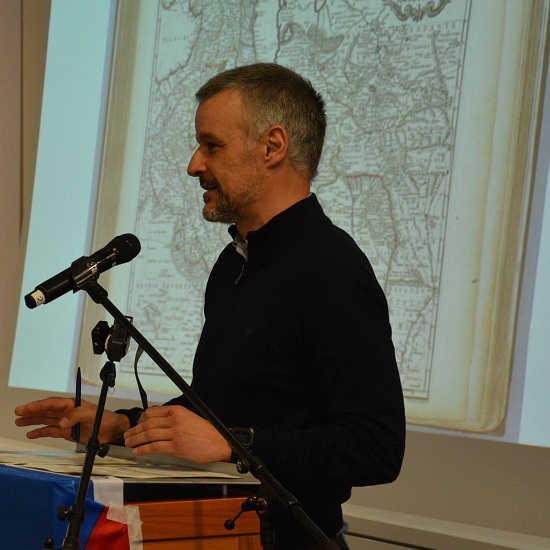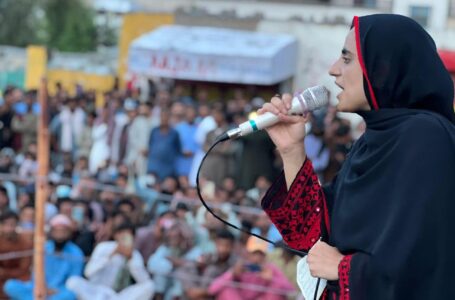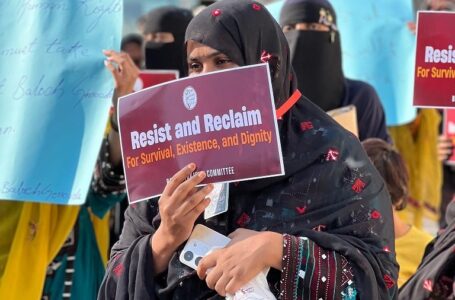FBM Holds Simultaneous Protests Against Pakistan’s Nuclear Tests on Baloch Land
Unheard Balochistan: Past and Present

By Karlos Zurutuza
The Baluch remember the 75th anniversary of the forced annexation of part of their land by Pakistan, and also that the Ayatollahs and Taliban occupy the rest. The Baloch are committed to a “secular and democratic” project.
A conference room at a hotel on the outskirts of Hamburg was reserved last Saturday to commemorate the historical event that is always overlooked by the rest of the world: eight months after declaring its independence, Eastern Balochistan was annexed by Pakistan. 75 years have passed since that March 27, 1948.
The Free Balochistan Movement organised the conference with the participation of experts and political and social activists, both Baluch and foreigners. After the introductions, the floor was given to Martin Axmann, Ph.D. in Political Science and author of the book “Back to the Future” (Oxford, 2008). This is one of the most referential recent books on the Baluch issue, one that seeks, in the author’s words, to scientifically prove that the Baluch are a nation, with their language and territory.
“I don’t quite understand how a territory divided by the borders of Iran, Pakistan and Afghanistan is so unknown to the rest of the world; I can’t think of another stateless nation that receives as little attention as the Baluch, “lamented the German expert.
Then there is the most atrocious misery. 75 years after its occupation, East Balochistan remains the largest province in the country, but also the most depopulated; the one with the highest rates of illiteracy and infant mortality; the most punished by violence; the richest in resources, but its inhabitant, the Baloch people are the one who cook with camel dung despite, paradoxically, walking on enormous gas and other natural reserves.
Axmann, however, asks not to put all the blame on the occupiers alone. “The Baluch continue to suffer from a lack of unity and a leadership accepted by the majority in a territory that is both diverse and cross-border,” he argues. The lack of international support doesn’t help either. According to Axmann, the Baluch have no friends in the international arena.
“Why doesn’t the news from Balochistan make it to the newspapers?” Someone asks from the audience. Also from the audience, Habib Baloch, a Baloch journalist in exile in Germany, responds: “Foreign journalists are prohibited from entering and deported if they violate the ban. We, local journalists, get a call even before our article is published.” “You have a five-year-old son, do you want him to stay alive?” He chose to leave the country because dozens of his colleagues were murdered. According to Reporters Without Borders “one of the most dangerous places in the world for journalists in Balochistan.”
THE ROJAVA MODEL
It is the turn of Kawa Fathi, a Kurd from Rojhelat (Kurdistan under Tehran’s control), representing the Kurdish liberation movement.
” Woman, life and freedom’ have become the slogan of the [the current] protest, but let’s not forget that the first time it was chanted was in Northern Kurdistan (under Turkish control) ten years ago,” recalls the young man.
Kurds and Baluchs, he adds, “have become the spearhead of the movement against the clerics”, something that would corroborate a large number of victims of both peoples since the protest broke out in September.
Fathi also underlines the danger posed by the division in the protest between “those nostalgic for the monarchy and minorities such as Kurds or Baluch, who seek the decentralisation and democratisation of the country.”
An audience questioned him, “Have the Kurds given up their independence in favour of the democratic confederalism they always talk about? Can this model be transferred to Balochistan?” they ask. “There is the model of Rojava,” replies the Kurd. As for independence, “nothing is given up.”
The session was closed by Shahzavar Karimzadi, a former West Balochistan political prisoner, Professor of Economics at the University of Hertfordshire (England) and Vice-President of the Free Balochistan Movement.
He speaks of Iran and Pakistan as “projects without a national identity, but which serve to implement the strategy of colonial aggression of the Persians and Punjabis.”
He says that the problem is “We are surrounded by criminals: the Taliban in the north; the Punjabis in the West and the clerics in the East, not counting the Arabs of the Gulf…”, the Baloch reels, in front of a map of the region projected on a screen.
He then asks for hope and unity, and that this be articulated around a secular and democratic project for his people.
“The 21st century is that of women, the Kurds and the Baluch”, he concludes.
This article was originally published in Spanish at: https://www.naiz.eus/en/hemeroteca/gara/editions/2023-03-28/hemeroteca_articles/estamos-totalmente-rodeados-de-criminales










